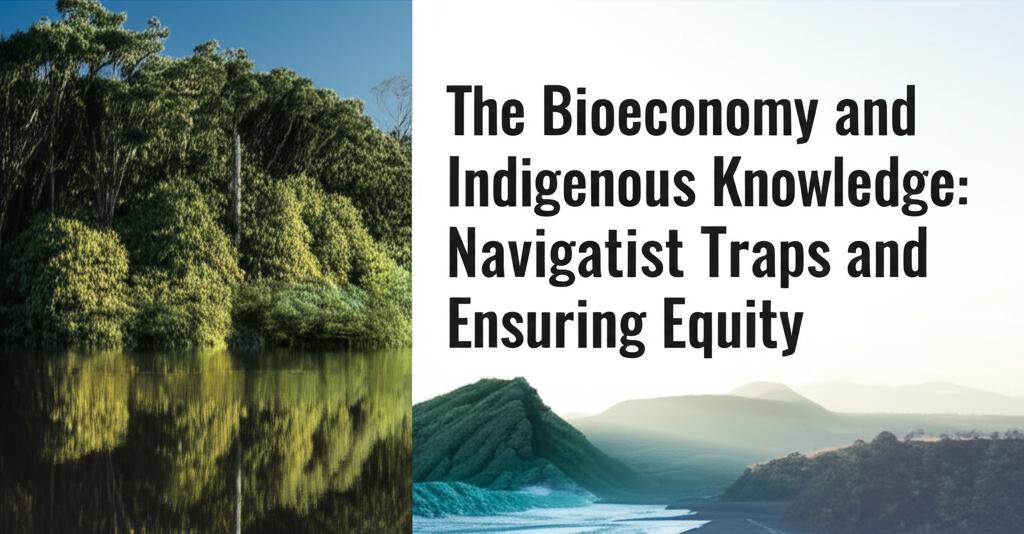The bioeconomy, an economic and productive model centered on the use of renewable biological resources for goods and services, is increasingly recognized as a vital strategy for sustainable development. It holds the potential to align environmental protection with economic growth and social well-being. However, for the bioeconomy to be truly sustainable and equitable, especially concerning Indigenous Peoples and Local Communities (IP&LCs), it must navigate several challenges, including the pitfalls of capitalist models and the need to genuinely incorporate and protect Indigenous knowledge.
The Role and Value of Indigenous KnowledgeIndigenous peoples have developed and practiced bioeconomic principles for centuries, possessing deep, ancestral knowledge about an A bioeconomy that is more than just an economic sector; it embodies ethical and normative values regarding the human-nature relationship. This traditional ecological knowledge (TEK) is dynamic, constantly evolving, and intertwined with cultural practices, spirituality, and livelihoods. It offers invaluable insights into sustainable resource management, biodiversity conservation, and adaptive strategies that can inform and enhance modern bioeconomic approaches. Experts argue that the success of the bioeconomy will heavily depend on recognizing and integrating this knowledge.
Capitalist Traps and the Risk of ExploitationA significant concern is that the growing global bioeconomy, currently valued at trillions of dollars and projected to expand massively, could replicate exploitative capitalist patterns. There's a risk that a "buccaneering" bioeconomy could emerge, prioritizing profit over people and the environment. The very definition of "bioeconomy" is often ambiguous, allowing large corporations and agribusinesses, some of which may violate Indigenous rights, to benefit from bioeconomy subsidies.
One major challenge is biopiracy – the exploitation of Indigenous knowledge and biological resources by pharmaceutical companies, researchers, or other industries without fair compensation or recognition for the communities who nurtured this knowledge. Colonial legacies that disregard or exploit Indigenous knowledge often underpin such practices.
Ensuring Equity and Fair Benefit-SharingTo counteract these risks and ensure an ethical bioeconomy, several key principles and actions are necessary:
- Free, Prior, and Informed Consent (FPIC): Indigenous communities must have the right to give or withhold consent for any bioeconomic projects affecting their lands, resources, or knowledge.
- Equitable Benefit-Sharing: Mechanisms must be established to ensure that the benefits derived from the use of Indigenous knowledge and resources are shared fairly with the communities. This includes both monetary and non-monetary benefits, such as capacity building and knowledge sharing.
- Respect for Cultural Integrity: Bioeconomic initiatives must respect the cultural practices, values, and self-determination of Indigenous peoples.
- Protection of Indigenous Rights: The rights of Indigenous peoples to their lands, territories, and resources are crucial for their continued role in stewarding biodiversity and for the success of an equitable bioeconomy.
- Valuing Traditional Production Methods: A truly Amazonian bioeconomy, for example, must preserve traditional production methods and local knowledge, commit to zero deforestation, value biodiversity, and equitably share benefits.
- Co-development and Partnerships: Moving beyond extractive models requires genuine partnerships where Indigenous communities are treated as equal partners in the development and governance of bioeconomic initiatives. This involves continuous dialogue and collaboration.
- Capacity Building: Investing in the capacity of Indigenous communities to participate in and lead bioeconomic enterprises is essential. This includes providing technical assistance and supporting local businesses.
- Redefining Value: The bioeconomy's success shouldn't solely be measured by economic productivity. Indicators should also include social justice, cultural integrity, and ecological health. The socio-environmental services provided by Indigenous communities in protecting forests and biodiversity must be recognized as an integral and compensable part of the bioeconomy.
Some scholars propose the term "sociobioeconomy" to emphasize an approach that considers the human and biological diversity of forest economies and prioritizes equity and the rights of Indigenous and local communities. This concept highlights activities that conserve and restore ecosystems, promote diverse agroecological practices, protect human and territorial rights, add local value to products, and integrate scientific knowledge with Indigenous and local knowledge.
International efforts, such as the G20 Initiative on Bioeconomy (GIB), are emerging. Brazil, during its G20 presidency, launched the GIB to establish high-level principles for the bioeconomy, focusing on inclusivity, equity, and sustainable development. Such initiatives aim to foster international collaboration and guide investments. The G20's second meeting on the Bioeconomy Initiative notably focused on the dialogue between traditional knowledge and contemporary science, acknowledging the trillions of dollars in revenue potential that a bioeconomy based on ancestral knowledge represents.
Challenges and the Path ForwardDespite growing recognition, significant challenges remain. The lack of clear, universally agreed-upon definitions and principles for the bioeconomy can be detrimental. There's a need to differentiate it from conventional economic practices that prioritize profit over sustainability and equity. Furthermore, the oral transmission of much Indigenous knowledge makes it vulnerable. Digital technologies offer new avenues for documenting and preserving this knowledge, creating valuable resources for both scientists and Indigenous communities.
Ultimately, transforming the bioeconomy into a force for social justice, equity, and environmental regeneration requires fundamental structural changes. It necessitates moving beyond purely techno-economic models to embrace Indigenous worldviews, rights, and governance. This involves decolonizing economic narratives and ensuring that Indigenous peoples are not just stakeholders but central architects of a bioeconomy that respects both people and the planet. The focus must be on processes that empower communities and protect ecosystems, rather than solely on products.

